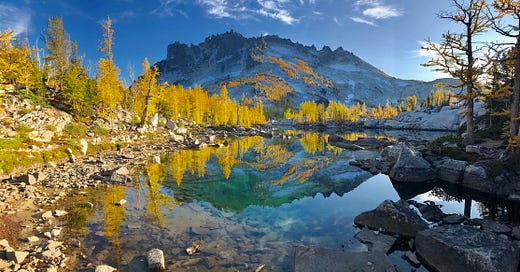One of the central hypotheses of my current work is the radical idea that it is possible - indeed necessary - to create a conception of an “us” without resorting to the demonization of a “them.” I’ve been wrestling with this question since I found myself reading Eric Hoffer’s 1951 classic True Believer (fittingly, the week before the 2016 election) where he writes:
Mass movements can rise and spread without belief in a god, but never without a belief in a devil.
I’d like to believe that’s not true. Here I’ll present a few of the voices I’m currently engaging with in thinking about how to address this question in light of the current moment we’re in.
1) I was fortunate to join a small convening in Tarrytown, NY a couple weeks back to explore the potential for collective action in the face of intersecting global crises (rising authoritarianism, climate change, economic inequality, etc.) At one point I found myself in a conversation with a fellow attendee about what motivates people to join movements, to engage in collective action. He contended that it was fear, or anger.
I’m not so sure.
2) I found myself reflecting on an article I read last year, featuring an interview with environmentalist Michael Soule entitled “We Only Protect What We Love.” It struck me at the time as a powerful insight, and one that spoke to my own motivation for the work that I do. It also hinted at part of the solution to the world we find ourselves in: we need to expand our conception of what we love.
3) In my early 20s I had an email signature for a while attributed to 17th century French theologian Francois Fenelon, that really resonated with me:
All wars are civil wars because all men are brothers... Each one owes infinitely more to the human race than to the particular country in which he was born.
I found the quotation simultaneously utterly compelling in its inarguable simplicity (there but for the grace of God)…and radical in its implications.
4) Much of my intellectual energy these days is consumed with how best to respond to the rise of far-right nationalism. Today I finished listening to a great interview on the Ezra Klein podcast featuring Michael Brendan Dougherty of the National Review. I love Ezra’s intellectual curiosity, and I found it a provocative listen, especially in dialogue with some of the other ideas kicking around in my head. Michael offers a defense of nationalism, seeing in it an effort to create a shared story around a new and larger “we”: beyond tribe, beyond family.
5) That seems to be the rub: how do we expand what john a. powell calls the “circle of human concern?” (I, like john, would extend the circle of human concern to include everything on earth, recognizing our fundamental interdependence). What is it that makes it so easy for me to embrace a global cosmopolitanism that sees a Burundian as my kindred, yet drives many among us to adopt a form of “othering” (to adopt another of john’s terms) that relies on an increasingly narrow and exclusionary “we”?
6) Enter political psychologist Karen Stenner, and her research on the “authoritarian predisposition.” She offers compelling evidence to suggest that much of this attraction toward authoritarianism (with its promise of certainty amid chaos, of hierarchy and order, of clear boundaries of “us” and “them”) is hardwired: it’s innate. She suggests it might be 50/50 nature/nurture. Which is frightening, because unlike something like race it’s not a purely social phenomenon. She explains that the authoritarian disposition lends itself to supporting an exclusionary nationalism, but holds out hope that it need not be inevitable. She elaborated in a recent interview on Yascha Mounk’s podcast:
There has to be something for people who really need to belong to an ‘us’ and have a very strong sense of the collective, there has to be something that makes ‘us.’ If it’s not shared race and ethnicity then you have to provide something in its place.
7) So what is that new story? In an era of global problems that require global solutions, I believe nationalism is neither practical nor morally defensible (Rana Dasgupta had a great piece on the demise of the nation state last year in the Guardian). Yet if we follow Stenner and Dougherty… we do need to replace the exclusionary nationalist impulse (which leads to authoritarianism) with a new and more inclusive “we.” In the face of climate change, this vision needs to encompass the earth and land as well: a truly expansive “we.”
8) George Monbiot offers what to me is a compelling answer in a “politics of belonging.” Indeed, it was a conversation with George in Oxford in 2017 that helped crystallize for me both the importance of telling a new story and in organizing that narrative around the concept of belonging. Resonated for me with my own story of self in this world (subject of another post, perhaps), and set me on a path that led to my current work with john powell and others around building a movement based on belonging (I write this the week after 1,500 of us convened for the third bi-annual Othering & Belonging Conference in Oakland, CA, hosted by the Haas Institute at UC Berkeley).
I intended this post to be a reflection more on love versus anger as a motive force for action, but this is where I ended up. Perhaps next time I’ll stay on track, but it’s getting late. I welcome feedback, suggestions for future topics (next: privilege, guilt, and responsibility), and opportunities for partnership. Let’s co-create.



“Let my love open the door to your heart.” 💜